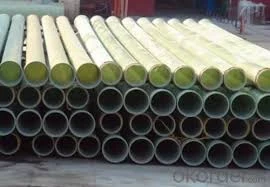Efficient Water Treatment Solutions with FRP Desalination Pipes and Fittings for Optimal Performance
The Role of FRP Desalination Pipes and Fittings in Efficient Water Treatment
In recent years, the growing demand for fresh water has prompted innovative solutions to address the world’s escalating water scarcity. With populations booming and climate change affecting water resources, desalination has emerged as a viable means of converting seawater into potable water. Integral to this process are the specialized pipes and fittings used in desalination systems. Among the most promising materials for these applications are Fiberglass Reinforced Plastics (FRP), which offer a myriad of advantages that promote efficient water treatment.
FRP pipes and fittings are designed specifically to withstand the harsh conditions associated with desalination processes. These components are composed of a polymer matrix reinforced with fiberglass, which imparts strength and durability. Unlike traditional materials such as metal, FRP is highly resistant to corrosion, an essential characteristic given the saline environments they operate in. This resistance increases the lifespan of the infrastructure, minimizes maintenance costs, and ensures a steady supply of fresh water over time.
One of the significant benefits of employing FRP in desalination systems is its lightweight nature. Compared to conventional materials, FRP is considerably lighter, making transport and installation more straightforward and cost-effective. This attribute not only reduces labor costs associated with installation but also allows for the construction of more complex systems that are often required in advanced desalination plants.
Moreover, the design flexibility of FRP allows for the creation of bespoke piping and fitting solutions tailored to the specific needs of each desalination facility. This adaptability enables engineers to optimize flow rates, reduce energy consumption, and increase the overall efficiency of the water treatment process. Custom-designed pipes can be matched precisely to the dimensions and operational requirements of a desalination unit, enhancing performance and reliability.
frp desalination pipes and fittings for efficient water treatment ...

Temperature control is another vital aspect of desalination processes. FRP materials have excellent thermal insulation properties, helping to maintain optimal temperatures within the system. This characteristic is essential for processes such as reverse osmosis, where temperature fluctuations can significantly impact efficiency and end-product quality. By providing stable thermal conditions, FRP piping systems contribute to overall energy efficiency, ultimately leading to lower operational costs.
Furthermore, the environmental considerations surrounding FRP materials cannot be overlooked. As global awareness of sustainability and eco-friendliness grows, FRP emerges as a suitable alternative due to its ability to reduce waste and energy consumption. The production of FRP can have a smaller carbon footprint compared to steel or concrete, making it a more sustainable option for desalination infrastructure. Additionally, the longevity and durability of FRP reduce the need for frequent replacements, further contributing to its environmental credentials.
However, successful implementation of FRP pipes and fittings in desalination processes requires careful consideration of design and engineering practices. It is crucial to ensure that the selected materials meet industry standards and are compatible with the various chemicals used in water treatment. Collaborations between manufacturers, engineers, and operators play a vital role in maximizing the benefits of FRP technology.
In conclusion, FRP desalination pipes and fittings represent a significant advancement in efficient water treatment technology. Their corrosion resistance, lightweight properties, design flexibility, excellent thermal insulation, and sustainability make them an ideal choice for modern desalination processes. As the global community continues to grapple with water scarcity issues, the incorporation of innovative materials like FRP will be paramount in developing effective and sustainable solutions for water treatment. The future of desalination looks promising, and FRP is set to play a crucial role in ensuring a reliable supply of fresh water for generations to come.
Latest news
-
Oblate Tanks: Space-Saving, Durable Liquid Storage SolutionsNewsAug.27,2025
-
High-Performance Piping System Solutions for Industry & Commercial UseNewsAug.26,2025
-
Precision Fittings: Durable & Reliable Industrial & Plumbing SolutionsNewsAug.25,2025
-
Practical Steps: Unlock Success with Our Proven GuidesNewsAug.24,2025
-
Transport Tanks: Safe, Durable & Efficient Liquid HaulingNewsAug.23,2025
-
High-Quality Piping Systems for Efficient Flow & DurabilityNewsAug.22,2025











